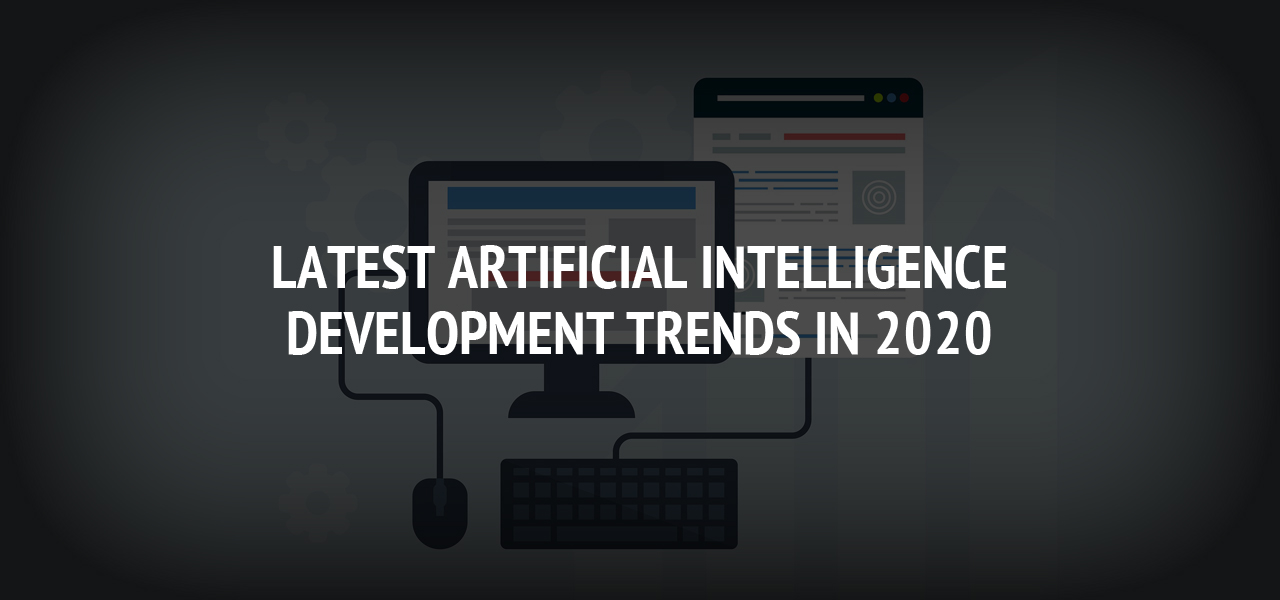Latest Artificial Intelligence Development Trends in 2020

Artificial Intelligence is gathering speed no doubt and will likely gain more acceleration in 2020. There are negatives to AI but, overall, it is all going to be helpful for businesses and individuals. Activity is certainly hectic with facial recognition being used to catch drug offenders in Shanghai and Intel considering thermal imaging and facial recognition with AI. Just how hot the market is can be gauged from the fact that Apple bought Xnor.ai edge AI experts for $ 200 million. Airbnb is using AI to check if customers are psychopaths and Facebook is coming down hard on deepfakes before the presidential election even as the US warns Europe not to over regulate AI. Google claims its artificial intelligence is better than doctors at detecting breast cancer and its AI project also targets wildlife preservation. There is artificial general intelligence work going on that seeks to bring human like intelligence to machines and there is conversational AI that will make talking with web chatbots a lot more interesting. However, what sparkles in AI tech today is Swarm Intelligence. This is a Blackfin project by security giant F-Secure, in which swarm intelligence should take artificial general intelligence to greater heights.
Swarm Intelligence
The implications are stupendous. AI seeks to endow machines with near human intelligence. Think of minds collectively linked together. The Project Blackfin seeks to achieve this goal in which autonomous AI agents work together in various areas such as IoT and security. You have a team of collaborative, intelligent bots working together in synergy. It will take years for swarm intelligence to become mainstream but benefits will naturally start percolating. One can take a leaf out of the swarm intelligence book and see how independent bots can be linked in some areas such as, for example, security, data and communications.
Conversational AI, natural language translations
Humans created language barriers that impede communication. Hopefully, AI is stepping in with its natural language processing and translation assistance. As the technology matures we should see more adoption in business and government. What this means is that doing business in Spain, South America, Africa, East Europe, South Asia becomes easier with natural language processing and translations. It could also have a darker side in that translators may become a vanishing species and, in future, people may not take the trouble to learn languages. Here is an interesting tidbit on how hot the market is: Baidu raced ahead of Microsoft and Google in designing a machine that can understand human language. Anyway, talking to bots could be fun because they are not likely to sound waspish or lose their temper. Land on websites of the future and it is not a mere bot that pops up to welcome you but an AI conversational one that carries on a chat almost like a human does. Samsung, for instance, is working on project Neon that seeks to endow avatars with human expressions, capability of dialogue and even movements. Go to a top hotel and, if they have this technology, you are likely to be met by a virtual receptionist fluent in all languages, ever at your service.
Music, entertainment and media
This segment is also seeing quite a bit of activity on the AI front. Amazon is working on DeepComposer, a machine learning musical keyboard that lets you experiment with music and generate variations. Entertainment and media segments are likely to implement more AI into their business to recognize patterns and choices as well as individual customer behavior so that they can “push” content. It does not end there. We are likely to see AI playing a central role in selecting and creating script, directing actors and in various segments of film making so that producers can rake in cash with higher chances of success for their productions.
Deepfakes
Deepfake videos are viral on the internet. It can be fun and amusing but it can also be used for malafide purposes. If AI can be used to create deepfakes then it can also be used to detect such fake pictures and videos. Those working in this segment are likely to be kept busy as more deepfake images and videos of celebrities do the rounds of the internet.
Data to the edge
On a more practical and useful note for businesses, AI will take care of analyzing big data in real time and give you learned insights, like a smart Jeeves helping business Berties in every way. Data gathering and analysis is complex and expensive so they are moving it to the edge. The result is faster responses in real time and ability to proact. So, AI need not be the preserve of businesses with deep pockets.
Facial recognition and machine learning
Facial recognition is too good a technology to ignore. Businesses, banks and governments simply use facial recognition in a variety of ways and this should see wider implementation in the time to come. Facial recognition and AI needs data as does machine learning but data synthesis will emerge into the foreground. This means even smaller businesses and organizations can adopt facial recognition for security, access and other purposes. It should not be too difficult to find AI developer to come up with facial recognition solution for your business or government.
AI, IoT and manufacturing
First there were (and still are) programmable logic controllers, then computerized control and now there is AI to take automation in manufacturing to new heights of sophistication with full capability of error checks, machine maintenance and production planning. Here again, manufacturing industry should take a decisive step to push for AI-IoT into their setup to stay competitive and jump ahead.
Business and governance will certainly benefit but it is in healthcare industry that AI is likely to have the biggest impact and corresponding all round benefits.
AI in healthcare – drug discovery
Developing new molecules is a tedious and time consuming process with plenty of clinical trials involved in the process. AI steps in and helps in faster and more precise analysis that can also lead to drug discoveries. This means less cost that will pass on to patients.
AI for better (and cheaper) healthcare
GE is one of the companies engaged in pushing the limits of AI implementation in healthcare. Their Edison program includes visualization, data aggregation, curation, traceability and model training. The company works with AI companies like MaxQ, Volpara and Koios to develop AI based technologies such as risk assessment for breast cancer.
Amazon is doing its bit by offering transcribe medical that will precisely and accurately transcribe whatever the doctor speaks into his smartphone.
AI and machine learning will spur growth in automatic diagnosis or better diagnosis and prediction, leaving doctors free to focus on more critical issues. Facial recognition and other symptom recognition can be baked into programs that can remotely and visually diagnose patients during a video chat or conference.
Benefits of AI
- AI can help automate mechanical tasks leaving humans free to focus on tasks leaving them free to make better use of their faculties and thus enjoy their work.
- Buyers online will have better service and access to suggestions that will help them make better informed purchases.
- In the area of healthcare it certainly helps in various ways like better diagnosis, disease prediction, doctor interaction, epidemic identification and prevention and lots more. This is perhaps one area where humans will benefit the most from AI.
The downside is that AI could lead to security concerns, lack of privacy and redundancy in jobs. Overall, AI helps humans at personal level, in business and in governance. Should you be in any of these sectors it is a good idea to think of retaining an AI developer to infuse artificial intelligence into your operations.
About The Author
Related Blog
View All-
Implementing Professional Services Automation: A Guide
For companies in the professional services sector, streamlining operations and maximizing efficiency are hallmarks of growth and customer satisfaction. This is precisely where implementing professional services automation (PSA) becomes crucial. PSA tools offer ...
-
Why Node JS is Considered as a Perfect Enterprise App Development Platform?
Wondering what’s all the hype around Node JS lately? Why so many large-scale enterprise companies seem to have fallen in love with the platform? Well, you’re not alone! It all started when Ryan Dahl, the creator of Node JS, demonstrated it for the ...







